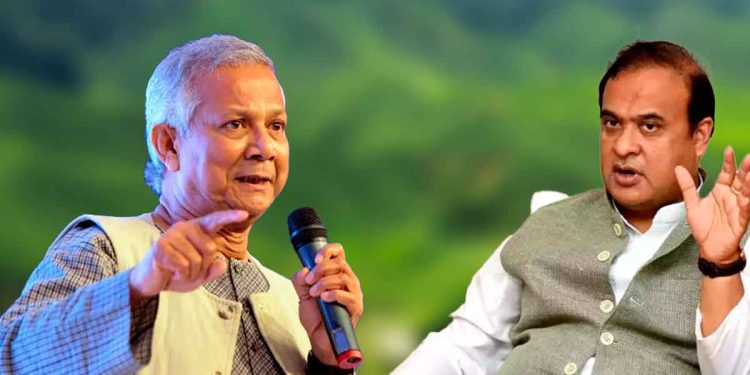Assam Chief Minister Dr. Himanta Biswa Sarma has strongly condemned comments made by Bangladesh’s interim government Chief Adviser Muhammad Yunus regarding India’s northeastern states, calling them “offensive” and “provocative.” Sarma urged the Government of India to take decisive action, warning that such statements reflect deeper strategic motives with long-term geopolitical implications.
During a high-profile visit to China, Yunus advocated for stronger economic ties between Bangladesh and China, suggesting that Beijing’s engagement could extend to India’s seven northeastern states. He emphasized that these states are landlocked and could benefit from access through Bangladesh, positioning his country as the region’s “guardian of the ocean.”
Reacting to Yunus’s statements, Chief Minister Sarma warned against the narrative of vulnerability surrounding India’s Siliguri Corridor, commonly known as the “Chicken’s Neck.” He expressed concern over past suggestions, including from internal Indian elements, to compromise this strategic passageway, which serves as the only link between India’s northeastern states and the mainland.
“This remark underscores the persistent vulnerability associated with the Chicken-Neck Corridor,” Sarma stated. “It is crucial to develop a more robust railway and road network both underneath and around this corridor. Additionally, we must explore alternative routes connecting the Northeast to mainland India, effectively bypassing the Chicken-Neck.”
Sarma emphasized that while alternative infrastructure projects may pose significant engineering challenges, they are feasible with determination and innovation.
Muhammad Yunus’ Controversial Remarks
During a high-level roundtable discussion on ‘Sustainable Infrastructure and Energy’ at The Presidential Hotel in Beijing, Yunus underscored Bangladesh’s strategic importance. He stated that India’s northeastern states lack direct access to the sea and positioned Bangladesh as the region’s “only guardian of the ocean.”
“They have no way to reach out to the ocean. We [Bangladesh] are the only guardian of the ocean for this region,” Yunus asserted. His remarks were widely interpreted as an invitation for China to expand its influence in India’s northeastern states, raising alarms in New Delhi over potential geopolitical shifts.
Geopolitical Implications: India’s Concerns Over China’s Influence
India has historically viewed any increasing Chinese presence in its neighboring countries with caution. Bangladesh’s proximity to the Siliguri Corridor adds to the concerns, as any foreign influence in the region could impact India’s security and connectivity.
Sarma’s comments reflect broader apprehensions within the Indian government regarding Bangladesh’s evolving diplomatic stance. Several Indian political leaders have warned that Yunus’s remarks may signal a shift in Bangladesh’s geopolitical alignment, especially in the context of Beijing’s growing influence in South Asia.
The diplomatic ramifications of Yunus’s statements are yet to unfold, but experts predict that India may respond with increased infrastructure investments and strategic policy measures to counterbalance any perceived threats to its territorial integrity.
Who is Muhammad Yunus?
Muhammad Yunus, born on June 28, 1940, in Chittagong, Bangladesh, is a Nobel Prize-winning economist and social entrepreneur. He is best known for pioneering the concept of microfinance through the Grameen Bank, which provides small loans to impoverished individuals to support financial independence.
A recipient of prestigious awards, including the United States Presidential Medal of Freedom and the Congressional Gold Medal, Yunus has played a significant role in economic development and social entrepreneurship. However, his recent remarks on India’s northeastern states have stirred controversy and placed him at the center of a geopolitical debate.





